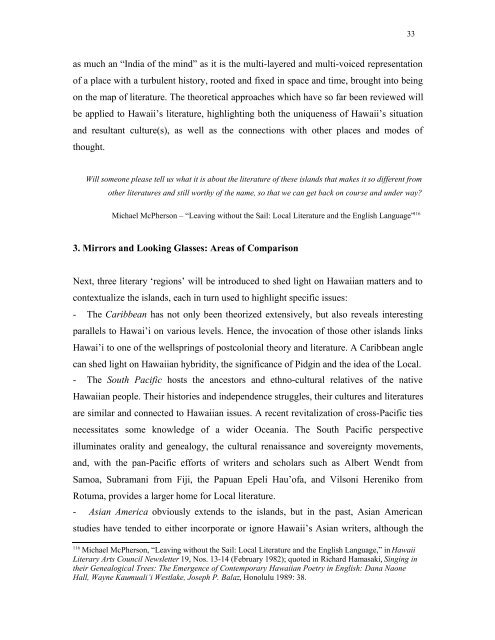A Paradise Lost - KOPS - Universität Konstanz
A Paradise Lost - KOPS - Universität Konstanz
A Paradise Lost - KOPS - Universität Konstanz
Create successful ePaper yourself
Turn your PDF publications into a flip-book with our unique Google optimized e-Paper software.
as much an “India of the mind” as it is the multi-layered and multi-voiced representation<br />
of a place with a turbulent history, rooted and fixed in space and time, brought into being<br />
on the map of literature. The theoretical approaches which have so far been reviewed will<br />
be applied to Hawaii’s literature, highlighting both the uniqueness of Hawaii’s situation<br />
and resultant culture(s), as well as the connections with other places and modes of<br />
thought.<br />
Will someone please tell us what it is about the literature of these islands that makes it so different from<br />
other literatures and still worthy of the name, so that we can get back on course and under way?<br />
Michael McPherson – “Leaving without the Sail: Local Literature and the English Language” 116<br />
3. Mirrors and Looking Glasses: Areas of Comparison<br />
Next, three literary ‘regions’ will be introduced to shed light on Hawaiian matters and to<br />
contextualize the islands, each in turn used to highlight specific issues:<br />
- The Caribbean has not only been theorized extensively, but also reveals interesting<br />
parallels to Hawai’i on various levels. Hence, the invocation of those other islands links<br />
Hawai’i to one of the wellsprings of postcolonial theory and literature. A Caribbean angle<br />
can shed light on Hawaiian hybridity, the significance of Pidgin and the idea of the Local.<br />
- The South Pacific hosts the ancestors and ethno-cultural relatives of the native<br />
Hawaiian people. Their histories and independence struggles, their cultures and literatures<br />
are similar and connected to Hawaiian issues. A recent revitalization of cross-Pacific ties<br />
necessitates some knowledge of a wider Oceania. The South Pacific perspective<br />
illuminates orality and genealogy, the cultural renaissance and sovereignty movements,<br />
and, with the pan-Pacific efforts of writers and scholars such as Albert Wendt from<br />
Samoa, Subramani from Fiji, the Papuan Epeli Hau’ofa, and Vilsoni Hereniko from<br />
Rotuma, provides a larger home for Local literature.<br />
- Asian America obviously extends to the islands, but in the past, Asian American<br />
studies have tended to either incorporate or ignore Hawaii’s Asian writers, although the<br />
116 Michael McPherson, “Leaving without the Sail: Local Literature and the English Language,” in Hawaii<br />
Literary Arts Council Newsletter 19, Nos. 13-14 (February 1982); quoted in Richard Hamasaki, Singing in<br />
their Genealogical Trees: The Emergence of Contemporary Hawaiian Poetry in English: Dana Naone<br />
Hall, Wayne Kaumuali’i Westlake, Joseph P. Balaz, Honolulu 1989: 38.<br />
33

















